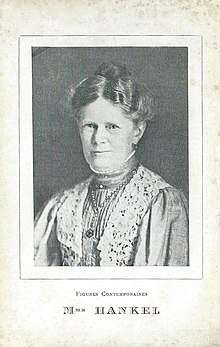Marie Hankel
Marie Hankel (1844–1929) was a German writer of Esperanto literature. She is known for founding the Esperantista Literatura Asocio (Esperanto Literature Association) She also advocated for women's suffrage.[1]
Marie Hankel | |
|---|---|
 Maria Hankel (photographed by Hugo Erfurth) | |
| Born | Marie Dippe 1844 Schwerin, Germany |
| Died | 1929 (aged 84–85) |
| Nationality | German |
| Occupation | Writer, translator |
| Spouse(s) | Hermann Hankel |
Life
Hankel née Dippe was born in 1844 in Schwerin, Germany. In 1905 she learned Esperanto and subsequently wrote poetry and prose in that language. Her titles include La simbolo de l' amo (The symbol of love), Tri unuaktaj komedioj (Three first-person comedies), and Sableroj (Sands).[2] In 1909 she participated and won the literary contest Internaciaj Floraj Ludoj (International Floral Games). In 1910 she spoke in support of women's suffrage at the annual World Esperanto Congress in Washington, D.C.. In 1911 she founded and became the first president of the Esperantista Literatura Asocio (Esperanto Literature Association) at that year's World Esperanto Congress in Antwerp.[3]
Hankel died in 1929.[2]
Legacy
In 2003 a street in the Laubegast district in Dresden was named in her honor.[3]
References
- American Esperanto Magazine. American Esperantist Company. 1910. p. 66.
- Dressen, Hilda. "Marie Hankel". Originala Literaturo Esperanta. Retrieved 5 August 2019.
- Sutton, Geoffrey (2008). Concise Encyclopedia of the Original Literature of Esperanto, 1887-2007. Mondial. pp. 52–53. ISBN 9781595690906.